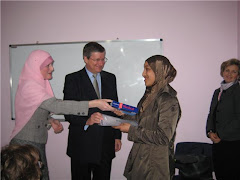


Congratulations to all my Medical English students who graduated on Thursday the 16th of July 2009!! I’m so proud of you!
At the graduation ceremony, Dr Lindsay Edouard, Representative of the United Nations Population Fund (UNFPA) in Algeria, gave a fascinating talk entitled ‘From Medicine to International Development’.
This was followed by a short speech by myself, a presentation of the certificates by Dr Edouard and finally by a reception for further discussion and refreshments. It also gave me the opportunity to take lots of photos which can be found on the Algerian Medics Facebook Group http://www.facebook.com/event.php?eid=103530842894#/group.php?gid=48979073152&ref=ts
Dr Edouard’s talk started with a description of the United Nations Population Fund (UNFPA), this acronym reflecting its original name: the United Nations Fund for Population Activities. He focussed largely on its activities in the area of reproductive health.
He challenged the audience to think about the wider perspective of medicine by examining the relevance of public health with its emphasis on epidemiology, a quantitative science which looks at the control and spread of disease, risk factors and how to reduce them. He continued by discussing the rationale for resource allocation so as to meet priority needs of a population.
International health activities are currently guided by the eight Millennium Development Goals (MDGs), which range from addressing poverty to halting the spread of HIV/AIDS and providing universal primary education, all by the target date of 2015. These form a blueprint agreed to by all countries and leading development institutions. They have galvanized unprecedented efforts to meet the needs of the world’s poorest.
Goal 4 aims to reduce child mortality whereas Goal 5 is for improving maternal health. The following website provides detailed information regarding the goals, specific targets and related documentation: http://www.un.org/millenniumgoals
Dr Edouard highlighted that in public health, a small mistake can have major consequences as it affects a large number of individuals as opposed to clinical medicine where a mistake would affect just that individual patient. He also reminded us that once an intervention has been introduced in service delivery, it can be very difficult to modify it. He went further by mentioning the difficulties with the appropriate number and timing of prenatal visits: in implementing the findings of scientific studies for seeking cost-effectiveness, consideration is also given to the need for reassurance through regular check-ups.
For further objective information on the value of interventions in health care, Dr Edouard pointed us towards the websites of the National Institute for Health and Clinical Effectiveness, a British initiative, at http://www.nice.org.uk and the international Cochrane Collaboration at http://cochrane.co.uk/en/collaboration.html.
Hopeland Institute would like to thank Dr Edouard for his talk and participation in the graduation ceremony as our honoured guest and wish him well in his next post.



No comments:
Post a Comment